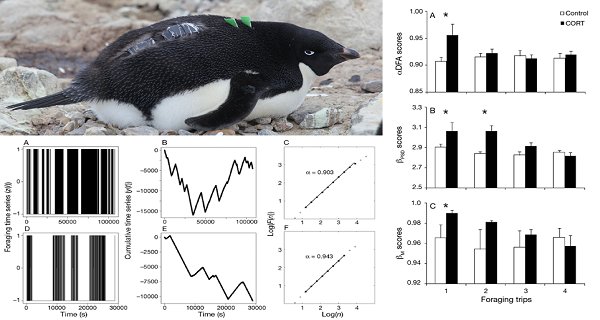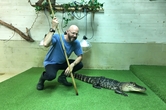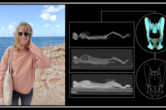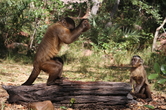Stressed Penguins Change Foraging Patterns

A new study published in Marine Ecology Progress Series has shown that foraging sequences of the Adelie penguin - a marine top predator and indicator species in Antarctic ecosystems - change during stressful conditions.
Stress hormone treatment and complexity loss
In the study, an international team of researchers from Japan and France including CICASP's own Dr. Andrew MacIntosh combined two relatively novel approaches, temporal fractal analysis applied to high-resolution data set collected via bio-logging, i.e. using animal attached data recording devices, from one of Antarctica's most charismatic species, the Adelie penguin (Pygoscelis adelieae). This approach allowed the researchers to examine hundreds of thousands of data points in the foraging sequences of numerous individual birds - the most ever examined in studies of fractal time in any free-living animal.
Previously, Dr. MacIntosh and his collaborators showed that observed fractal properties in penguin behavior - the dive pattern geometry found at each time scale looks remarkably similar to that found at any other scale within a certain range of temporal windows - suggest the presence of some general organizing principle underlying temporal patterns of penguin behaviour (see Little penguin, lots of scales. A growing body of literature is strongly suggesting that such patterns are adaptive, possibly providing an optimal foraging solution to navigating through scattered resource base. But what happens then if this dive sequence complexity is lost, like the stereotypical repetitive and functionless swimming patterns displayed by penguins and seals confined to small tanks in some zoos and aquaria?
With this in mind, the present study attempted to do two things: (1) to determine whether the experimental induction of stress affected patterns of diving and (2) to examine effects of this treatment on body mass and reproductive effort/success. Hormones in general are known to be a strong mediator of behavior, and in this regard the "stress" hormone corticosterone (cortisol in humans and other primates) is no exception, being heavily involved in behaviors related to survival and reproduction. Working at the French research station Dumont d'Urvilee in Terre Adelie, Antarctica, lead author Manuelle Cottin, now at the University of Queensland, used time-released corticosterone implants to induce transient increases in baseline corticosterone levels in a set of target male birds during the 2009-2010 breeding season. Results show altered foraging patterns in treated versus control birds, but interestingly, there were divergent effects at two different scales: at the foraging trip scale, stressed birds exhibited lower overall foraging effort and experienced global complexity loss in dive sequences, but at the same time individual dive-scale metrics suggest higher efficiency and prey pursuit rates than in control birds. This means that stressed birds may invest more heavily into small-scale strategies across shorter durations but may not be able to maintain adequate performance across larger time scales. However, the study found no short term effects on body mass and condition of either foraging birds or their offspring at the nest, nor in chick survival. Corticosterone levels had returned to normal by 3 weeks post-treatment.
While this study did not detect any significant consequences associated with the observed altered foraging patterns, stress and complexity loss may have major implications concerning the viability of individuals operating in a changing environment over the longer term. This study highlights the utility of using both traditional and fractal analyses to better understand scale-dependent responses of animals to energetic and various other environmental challenges.The application of fractal tools in particular opens up opportunities for more subtle and sensitive investigations of species used as indicators for climate and environmental change, like the Adelie penguins examined here.
This study was conducted by researchers at the Kyoto University Primate Research Institute in Japan and the Institut Pluridisciplinaire Hubert Curien and the Universite de Strasbourg of the Centre National de la Recherche Scientifique in France.
For more information, access the orignial article here at MEPS. This article appears as part of a Theme Section in the journal entitled Tracking fitness in marine vertebrates.











